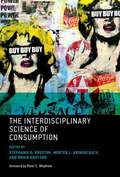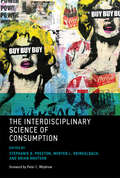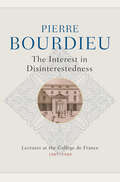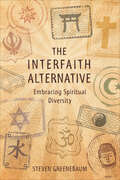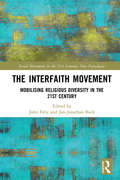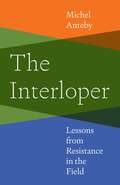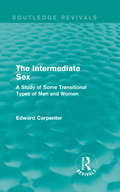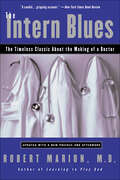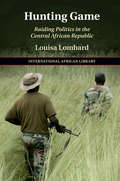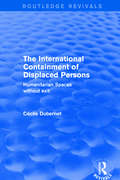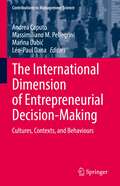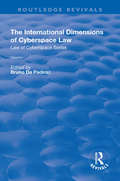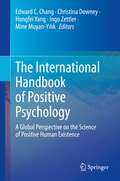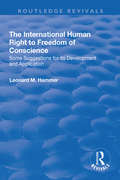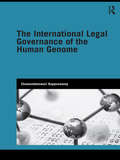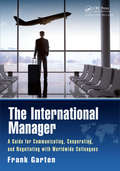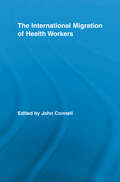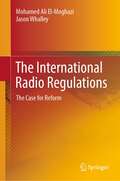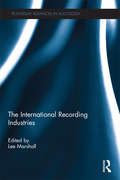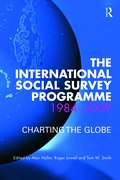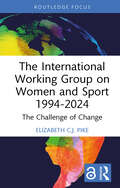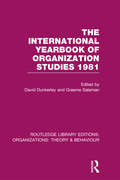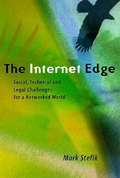- Table View
- List View
The Interdisciplinary Science of Consumption
by Peter C. Whybrow Stephanie D. Preston Morten L. Kringelbach Brian KnutsonOur drive to consume -- our desire for food, clothing, smart phones, and megahomes -- evolved from our ancestors' drive to survive. But the psychological and neural processes that originally evolved to guide mammals toward resources that are necessary but scarce may mislead us in modern conditions of material abundance. Such phenomena as obesity, financial bubbles, hoarding, and shopping sprees suggest a mismatch between our instinct to consume and our current environment. This volume brings together research from psychology, neuroscience, economics, marketing, animal behavior, and evolution to explore the causes and consequences of consumption. Contributors consider such topics as how animal food-storing informs human consumption; the downside of evolved "fast and frugal" rules for eating; how future discounting and the draw toward immediate rewards influence food consumption, addiction, and our ability to save; overconsumption as social display; and the policy implications of consumption science.Taken together, the chapters make the case for an emerging interdisciplinary science of consumption that reflects commonalities across species, domains, and fields of inquiry. By carefully comparing mechanisms that underlie seemingly disparate outcomes, we can achieve a unified understanding of consumption that could benefit both science and society.
The Interdisciplinary Science of Consumption (The\mit Press Ser.)
by Stephanie D. Preston Morten L. Kringelbach Brian KnutsonScholars from psychology, neuroscience, economics, animal behavior, and evolution describe the latest research on the causes and consequences of overconsumption.Our drive to consume—our desire for food, clothing, smart phones, and megahomes—evolved from our ancestors' drive to survive. But the psychological and neural processes that originally evolved to guide mammals toward resources that are necessary but scarce may mislead us in modern conditions of material abundance. Such phenomena as obesity, financial bubbles, hoarding, and shopping sprees suggest a mismatch between our instinct to consume and our current environment. This volume brings together research from psychology, neuroscience, economics, marketing, animal behavior, and evolution to explore the causes and consequences of consumption. Contributors consider such topics as how animal food-storing informs human consumption; the downside of evolved “fast and frugal” rules for eating; how future discounting and the draw toward immediate rewards influence food consumption, addiction, and our ability to save; overconsumption as social display; and the policy implications of consumption science.Taken together, the chapters make the case for an emerging interdisciplinary science of consumption that reflects commonalities across species, domains, and fields of inquiry. By carefully comparing mechanisms that underlie seemingly disparate outcomes, we can achieve a unified understanding of consumption that could benefit both science and society.
The Interest in Disinterestedness: Lectures at the College de France 1987-1989
by Pierre BourdieuA key feature of those who work for the state, in the legal system and in public services is that they claim to be putting their own personal interests aside and working in a disinterested fashion, for the public good. But is disinterested behaviour possible? Can law be treated as a set of universal rules that are independent of particular interests, or is this mere ideology? Is the state bureaucracy a universal class, as Hegel thought, or a structure that serves the interests of the dominant class, as Marx claimed?In his lecture courses at the Collège de France in 1987–88 and 1988–89, Pierre Bourdieu addressed these questions by examining the formation of the legal and bureaucratic fields characteristic of the modern state, uncovering the historical and social conditions that enable a social group to form and find its own interests in the very fact of serving interests that go beyond it. For a disinterested universe to emerge, it needs both the invention of a public service, or a spirit of service to the public cause, and the creation of a social universe in which individuals can pursue a career devoted to public service and be rewarded for it. In other words, it requires a process of specialization whereby autonomous, specific fields become established in the social cosmos within which a special kind of game that follows the rules of disinterest can be played out.By reconstructing the conditions under which an interest in disinterestedness emerged, Bourdieu sheds new light on the formation of the modern state and legal system and provides a fresh perspective on the many professions in modern societies that are oriented towards the service of the common good.
The Interfaith Alternative: Embracing Spiritual Diversity
by Steven GreenebaumThere is no them — there is only us, celebrating our common humanityWhatever your spiritual path, chances are that the primary tenets of your faith include universal love, acceptance, and compassion. Yet three thousand years after Moses, twenty-five hundred years after the Buddha, two thousand years after Jesus, and fifteen hundred years after Muhammad, we are still divided by our differences. Religious intolerance, discrimination, even persecution and violence make up the not-so-golden rule.The Interfaith Alternative shows us how we can celebrate each other without fear of losing our own identity. It illuminates the path to creating a nurturing spiritual community that honors and includes all religious languages—an alternative to Jews worshiping only with Jews, Christians with Christians, and Muslims with Muslims. In doing so, it demonstrates that through coming together in a mutually supportive environment we can concentrate on our shared desire to remake the world into a compassionate, loving place.At its core, Interfaith is about community and justice. Once we truly embrace diversity, we embrace our common humanity. A powerful antidote to the current climate of fear and mistrust, The Interfaith Alternative argues that it is not how we encounter the sacred, but what we do about it that counts—there are positive alternatives to religious lines in the sand.Steven Greenebaum is an Interfaith minister whose experiences directing choirs of different faiths and denominations have helped him to understand the profound wisdom of many spiritual traditions. Steven has dedicated his life to working for social and environmental justice. He is the founder of the Living Interfaith Church in Lynnwood, Washington.
The Interfaith Movement: Mobilising Religious Diversity in the 21st Century (Social Movements in the 21st Century: New Paradigms)
by John Fahy Jan-Jonathan BockAlthough its beginnings can be traced back to the late 19th century, the interfaith movement has only recently begun to attract mainstream attention, with governments, religious leaders and grassroots activists around the world increasingly turning to interfaith dialogue and collective action to address the challenges posed and explore the opportunities presented by religious diversity in a globalising world. This volume explores the history and development of the interfaith movement by engaging with new theoretical perspectives and a diverse range of case studies from around the world. The first book to bring together experts in the fields of religion, politics and social movement theory to offer an in-depth social analysis of the interfaith movement, it not only sheds new light on the movement itself, but challenges the longstanding academic division of labour that confines ‘religious’ and ‘social’ movements to separate spheres of inquiry.
The Interloper: Lessons from Resistance in the Field
by Michel AntebyA practical and theoretical guide for field researchers struggling with accessResistance is the bane of all field researchers, who are often viewed as interlopers when they enter a community and start asking questions. People obstruct investigations and hide evidence. They shelve complaints, silence dissent, and even forget their own past and deny having done so. How can we learn about a community when its members resist so strongly? The answer is that the resistance itself is sometimes the key.Michel Anteby explains how community members often disclose more than intended when they close ranks and create obstacles. He draws insights from diverse stories of resistance by uncooperative participants—from Nazi rocket scientists and Harvard professors to Disney union busters and people who secure cadavers for medical school dissection—to reveal how field resistance manifests itself and how researchers can learn from it. He argues that many forms of resistance are retrospectively telling, and that these forms are the routine products, not by-products, of the field. That means that resistance mechanisms are not only indicative of something else happening; instead, they often are the very data points that can shed light on how participants make sense of their worlds.An essential guide for ethnographers, sociologists, and all field researchers seeking access, The Interloper shares practical and theoretical insights into the value of having the door slammed in your face.
The Intermediate Sex: A Study of Some Transitional Types of Men and Women (Routledge Revivals: The Collected Works of Edward Carpenter)
by Edward CarpenterThe Intermediate sex collates papers from Edward Carpenter on his ideas about intermediate types. Carpenter claims that there are those in societies who hold an intermediate position between the two sexes and may have an inner sex in their mind that is different from their biological sex. Originally published in 1908, this version in1941, these papers present early observations about gender fluidity in both men and women, studying certain ‘types’ of intermediate people that he claimed were begin to emerge more obviously at the time of writing. This title will be of interest to students of gender studies.
The Intern Blues: The Timeless Classic About the Making of a Doctor
by Robert MarionThe classic “gripping account” of three young doctors in training at a New York City hospital, updated with a new preface and afterword (The New York Times Book Review).While supervising a small group of interns at a major New York medical center, Dr. Robert Marion asked three of them to keep a careful diary over the course of a year. Andy, Mark, and Amy vividly describe their real-life lessons in treating very sick children; confronting child abuse and the awful human impact of the AIDS epidemic; skirting the indifference of the hospital bureaucracy; and overcoming their own fears, insecurities, and constant fatigue. Their stories are harrowing and often funny; their personal triumph is unforgettable.This updated edition of The Intern Blues includes a new preface from the author discussing the status of medical training in America today and a new afterword updating the reader on the lives of the three young interns who first shared their stories with readers more than a decade ago.“Thought-provoking, informative.” —Publishers Weekly‘The diary format effectively dramatizes the often-agonizing decisions and compromises that are made in the face of sleepless nights and inexperience . . . an important book for anyone contemplating the long, arduous task of becoming a doctor.” —Library Journal
The International African Library: After Rape
by Holly PorterFollowing the ICC intervention in 2005, northern Uganda has been at the heart of international justice debates. The emergent controversy, however, missed crucial aspects of Acholi realities: that the primary moral imperative in the wake of wrongdoing was not punishment but, instead, the restoration of social harmony. Drawing upon abundant fieldwork and in-depth interviews with almost 200 women, Holly Porter examines issues surrounding wrongdoing and justice, and sexual violence and rape, among the Acholi people in northern Uganda. This intricate exploration offers evidence of a more complicated and nuanced explanation of rape and its aftermath, suggesting a re-imagining of the meanings of post-atrocity justice, whilst acknowledging the role of sex, power and politics in all sexual experiences between coercion and consent. With its wide investigation of social life in northern Uganda, this provocative study offers vital analysis for those interested in sexual and gender violence, post-conflict reconstruction and human rights.
The International African Library: Raiding Politics In The Central African Republic (The\international African Library #61)
by Louisa LombardThe International Containment of Displaced Persons: Humanitarian Spaces without Exit (Routledge Revivals)
by Cecile DubernetThis title was first published in 2001. This work examines four post-Cold War interventions launched on behalf of people on the move: international action in Iraq, Bosnia, Somalia and Rwanda. Because these crises accompanied the emergence of the concept of Internationally Displaced Persons (IDPs) in international relations, they have shaped the understandings of forced displacement issues, such as ethnic cleansing, need and humanitarian action. The author looks at attitudes towards IDPs, concluding that UN-backed interventions regarding displaced civilians were primarily about deterring, sometimes preventing, them from escaping places of conflict. Protection in this context became a device by which international protagonists sought to contain people on the move within the confines of their collapsed states. As a result, levels of safety effectively granted by the international community depended less on the vulnerability of populations than on Western fears of mass border crossings.
The International Dimension of Entrepreneurial Decision-Making: Cultures, Contexts, and Behaviours (Contributions to Management Science)
by Léo-Paul Dana Andrea Caputo Marina Dabić Massimiliano M. PellegriniThis book focuses on understanding the international behaviours of SMEs, entrepreneurial ventures, and entrepreneurs. The collection of contributions gathered in the book highlights the importance of cultures, contexts and behaviours that pertain to the international entrepreneurship arena. The respective chapters address topics such as entrepreneurial cognition, international entrepreneurial ecosystems, innovation, international market entry decisions, family SMEs, international human resources management, cross-cultural and indigenous entrepreneurship, social capital and sustainability in international markets. All contributions are based on the latest empirical and theoretical research, and provide key findings and concrete recommendations for scholars, entrepreneurs, organizations and policy makers.
The International Dimensions of Cyberspace Law (Routledge Revivals)
by Cyberspace SeriesThis title was first published in 2003. This text is part of the "Law of Cyberspace" series, which deals with the legal aspects of the emerging information society and corresponding ethical matters. The book examines the international dimensions of cyberspace law and the timeliness of drawing up the most appropriate international standard instrument for this environment, exploring ways and means of achieving it and defining the organization's precise role in this respect. The text presents the framework that UNESCO is helping to develop for the international community, with the participation of all the actors in cyberspace, aiming to be ethical, flexible and technologically neutral, multiform, and universal.
The International Handbook of Positive Psychology: A Global Perspective on the Science of Positive Human Existence
by Edward C. Chang Christina Downey Hongfei Yang Ingo Zettler Mine Muyan-YılıkThis handbook discusses the latest findings from different fields of positive psychology from a global perspective by providing a coherent framework to get a better understanding of the development and practice of positive psychology. It starts with the parameters of positive psychology and a summary of the historical rise of positive psychology (both first wave and second wave of positive psychology) in the US, and its slow but steady growth on a global scale. This handbook highlights the major contributions of positive psychologists across 17 major regions of the world on theory, research, assessment and Practice. It discusses how positive psychology can progress human living in different countries and it shows the reasons why positive psychology has become an important source in research and education around the world.
The International Human Right to Freedom of Conscience: Some Suggestions for Its Development and Application (Routledge Revivals Ser.)
by Leonard HammerThis title was first published in 2002: This text addresses the problem of conflict that arises between the human right to freedom of religion and the human right to freedom of belief, for example, certain religious beliefs are in conflict with certain women's rights. The pricipal goal of this book is to distinguish between the more formalized, and recognized, notion of protecting religious beliefs from what is referred to as conscientious beliefs - a belief external to a religious context.
The International Legal Governance of the Human Genome (Genetics and Society)
by Chamundeeswari KuppuswamyThe human genome is a well known symbol of scientific and technological progress in the twenty-first century. However, concerns about the exacerbation of inequalities between the rich and the poor, the developing and the developed states, the healthy and the unhealthy are causing problems for the progress of scientific research. The international community is moving towards a human rights approach in addressing these concerns. Such an approach will be piecemeal and ineffective so long as fundamental issues about economic, social and cultural rights, the so-called second generation of human rights, are not addressed. This book argues that, in order to be able to meaningfully apply a human rights framework to the governance of the human genome, the international human rights framework should be based on a unified theory of human rights where the distinction between positive and negative rights is set aside. The book constructs a common heritage concept with the right to development at its core and explores the content of the right to development through rational human rights theory. It is argued that the notion of property rights in the human genome should be placed within the context of protecting human rights, including the right to development. The concept of common heritage of humanity, contrary to the widely held belief that it is in opposition to patenting of gene sequences, supports human rights-based conceptions of property rights. This book fills a gap in the literature on international legal governance of the human genome will provide an essential reference point for research into the right to development, development issues in bioethics, the role of international institutions in law making and research governance.
The International Manager: A Guide for Communicating, Cooperating, and Negotiating with Worldwide Colleagues
by Frank GartenCurrently, internationally dispersed teams are commonplace among global companies. Managers are often aware conceptually of the different dimensions of culture, yet struggle to translate these concepts into their daily activities. This book gives managers insight into specific techniques they can use to better manage their intercultural teams and d
The International Migration of German Great War Veterans
by Erika KuhlmanThis book usesstory-telling to recreate the history of German veteran migration after theFirst World War. German veterans of the Great War were among Europe's mostvolatile population when they returned to a defeated nation in 1918, aftergreat expectations of victory and personal heroism. Some ex-servicemen chose toflee the nation for which they had fought, and begin their lives afresh in thenation against which they had fought: the United States.
The International Migration of Health Workers (Routledge Research in Population and Migration)
by John ConnellThis volume provides the first detailed overview of the growing phenomenon of the international migration of skilled health workers. The contributors focus on who migrates, why they migrate, what the outcomes are for them and their extended families, what their experiences in the workforce are, and ultimately, the extent to which this expanding migration flow has a relationship to development issues. It therefore provides new, interdisciplinary reflections on such core issues as brain drain, gender roles, remittances and sustainable development at a time when there has never been greater interest in the migration of health workers.
The International Radio Regulations: The Case for Reform
by Jason Whalley Mohamed Ali El-MoghaziThis book provides an in-depth introduction to the International Telecommunication Union (ITU) Radio Regulations (RR) and the policies that govern them. Established in 1906, these regulations define the allocation of different frequency bands to different radio services, the mandatory technical parameters to be observed by radio stations, especially transmitters, and the procedures for spectrum use coordination at the international level. The book analyzes the interactions between different national policies and the ITU RR, noting how these interactions influence spectrum policy on the national level, setting up a comparative framework within which to view these regulations and their effects. Beginning with an overview of the history of the origins ITU RR, the book takes a deep dive into the components of spectrum management including radio communication service allocation, wireless technology selection, radio usage rights, and spectrum rights assignment, placing each analysis within the context of the push and pull between national and international regulations. The book concludes with chapters discussing issues affecting the future of spectrum policy, including spectrum policy reform in developing countries, the WRC-19, and IMT-2020. Shedding light on the longest-running treaty documents in the history of modern telecommunications and arguing for reforms that allow it to address the needs of all nations, this book is useful to scholars and students of telecom policy, digital policy, ICT, governance, and development as well as telecom industry practitioners and regulators.
The International Recording Industries (Routledge Advances in Sociology)
by Lee MarshallThe recording industry has been a major focus of interest for cultural commentators throughout the twenty-first century. As the first major content industry to have its production and distribution patterns radically disturbed by the internet, the recording industry’s content, attitudes and practices have regularly been under the microscope. Much of this discussion, however, is dominated by US and UK perspectives and assumes the ‘the recording industry’ to be a relatively static, homogeneous, entity. This book attempts to offer a broader, less Anglocentric and more dynamic understanding of the recording industry. It starting premise is the idea that the recording industry is not one thing but is, rather, a series of recording industries, locally organised and locally focused, both structured by and structuring the international industry. Seven detailed case studies of different national recording industries illustrate this fact, each of them specifically chosen to provide a distinctive insight into the workings of the recording industry. The expert contributions to this book provide the reader with a sense of the history, structure and contemporary dynamics of the recording industry in these specific territories, and counteract the Anglo-American bias of coverage of the music industry. The International Recording Industries will be valuable to students and scholars of sociology, cultural studies, media studies, cultural economics and popular music studies.
The International Social Survey Programme 1984-2009: Charting the Globe (Social Research Today)
by Roger Jowell Max Haller Tom W. SmithThe social sciences rely more on the comparative method than on experimental data mainly because the latter is difficult to acquire amongst human populations. The International Social Survey Programme has played a pioneering role in creating and sustaining methodologically-sophisticated mass attitude surveys across the globe. Starting in 1984 with five nations, it now encompasses forty-five nations spread over five continents, each administering an identical annual survey to a random sample of their population. Analyses of the data or descriptions of the methodology already appear in over 3,000 publications. This book contains new contributions from three dozen eminent scholars who analyse and compare the perceptions and attitudes of citizens across all five continents, nations and over time. Subjects range from inequality and the role of the state; ethnic, national and global identities; the changing relevance of religion, beliefs and practices; gender roles, family values and work orientations; household and society. Some chapters focus on methodological issues; others focus on substantive findings. This book sets new standards for cross-cultural research.
The International Working Group on Women and Sport 1994-2024: The Challenge of Change (ISSN)
by Elizabeth C.J. PikeThis book comprehensively evaluates the role of the International Working Group on Women and Sport (IWG) – the world’s largest network dedicated to advancing gender equity and equality in sport, physical education, and physical activity – in influencing global and domestic policy and practice.The issues addressed by the IWG in its first three decades of activism reflect global socio-political progress, as well as emergent new problems, for women, sport, and human rights. The IWG’s commitment to collaboration with, among others, the International Olympic Committee and the United Nations has provided the foundations for globally accepted frameworks to address gender-based issues in and through sport. The advocacy work of the IWG is told via first-hand interviews with key personnel from each of the IWG Secretariats, from its establishment in 1994 to 2024, providing insight into the most significant issues, achievements, and outcomes for the international social movement for women and sport.The book is a useful resource for students in the sociology of sport, sport policy, leadership, management, coaching, and gender studies. It is also relevant to sport administrators, practitioners, policymakers, and those working in gender governance.
The International Yearbook of Organization Studies 1981 (Routledge Library Editions: Organizations)
by Graeme Salaman David DunkerleyThe diverse topics in this volume bring together developments in the field of organization studies. Although the approaches are by no means undifferentiated the articles share a commitment to a revitalized organizational analysis, an historically based analysis and one which attempts to understand the structure and impact of organizations in terms of the location of these organizations within structure of class and power.
The Internet Edge: Social, Technical, and Legal Challenges for a Networked World
by Mark J. StefikThis book offers an eagle's eye view of the Internet edge. It is about the experiences of those who encountered similar issues as they built precursors to the Net such as videotext, teletext, and the Source.
